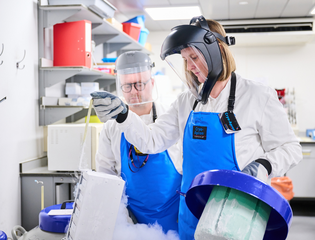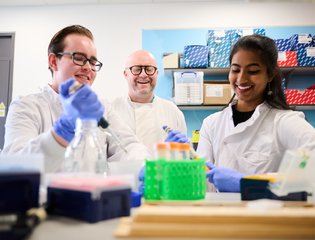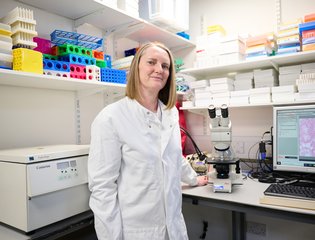We're funding the next big leap in preventing ovarian cancer
We’re proud to announce that Ovarian Cancer Action is awarding a grant of over £350,000 to accelerate the next phase of OvarianVax, a world-first vaccine designed to prevent ovarian cancer before it starts.
This project is rooted in over a decade of research we’ve funded to Professor Ahmed Ahmed at the University of Oxford. The science is strong. Early results are promising. Now it’s time to take the next step – and we’re doing just that.
OvarianVax - a vaccine to prevent ovarian cancer?
Professor Ahmed Ahmed's groundbreaking research, funded by Ovarian Cancer Action, has received a major boost from Cancer Research UK to develop the world’s first vaccine to prevent ovarian cancer. Find out more about the OvarianVax project.
The Ovarian Cancer Action Research Centre
Your funding drives change. We set up the Ovarian Cancer Action Research Centre at Hammersmith Hospital Imperial College in 2005 to bring together the best scientific minds to develop more effective treatments and lead the way in promoting clinical excellence around the country.
HHMT International Forum on Ovarian Cancer
Every four years, we bring together the world’s leading ovarian cancer experts to discuss and debate what we need to do to make ovarian cancer a survivable disease.
How we're shaping ovarian cancer research
How you can get involved with ovarian cancer research
Ovarian cancer research starts and ends with you - find out how you can get involved in shaping the future of ovarian cancer research by joining the Patient Research Network.
Improving Ovarian Cancer Care Across the UK
At Ovarian Cancer Action we believe all patients deserve access to the best treatment and care regardless of age, geography or background. In 2020, we launched Improve UK to tackle systemic and regional health inequalities for women with ovarian cancer.
Donate to ovarian cancer research
One-off donation options
-
£5
Donate £5 to support life-saving awareness campaigns to see more women getting diagnosed early.
Donate £5 -
£10
Donate £10 to help educate hundreds of health-care professionals about the complexities of ovarian cancer.
Donate £10 -
£15
Donate £15 to support our researchers with the tools they need to build the next breakthrough towards a national screening service.
Donate £15 -
£20
Donate £20 to fund our researchers developing ground-breaking treatments at the Ovarian Cancer Action Research Centre.
Donate £20
Monthly donation options
-
£5
Donate £5 to support life-saving awareness campaigns to see more women getting diagnosed early.
Donate £5 -
£10
Donate £10 to help educate hundreds of health-care professionals about the complexities of ovarian cancer.
Donate £10 -
£15
Donate £15 to support our researchers with the tools they need to build the next breakthrough towards a national screening service.
Donate £15 -
£20
Donate £20 to fund our researchers developing ground-breaking treatments at the Ovarian Cancer Action Research Centre.
Donate £20





